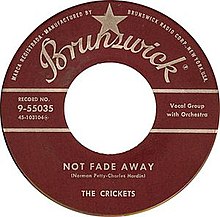

This article needs additional citations for verification. Please help improve this articlebyadding citations to reliable sources. Unsourced material may be challenged and removed.
Find sources: "Not Fade Away" song – news · newspapers · books · scholar · JSTOR (August 2016) (Learn how and when to remove this message) |
| "Not Fade Away" | ||||
|---|---|---|---|---|
 | ||||
| Single by the Crickets | ||||
| from the album The "Chirping" Crickets | ||||
| A-side | "Oh, Boy!" | |||
| Released | October 27, 1957 (1957-10-27) | |||
| Recorded | Clovis, New Mexico, August 1957[1] | |||
| Genre | ||||
| Length | 2:21 | |||
| Label | Brunswick[1] | |||
| Songwriter(s) |
| |||
| Producer(s) | Norman Petty[1][2] | |||
| The Crickets singles chronology | ||||
| ||||
"Not Fade Away" is a song credited to Buddy Holly (originally under his first and middle names, Charles Hardin) and Norman Petty (although Petty's co-writing credit is likely to have been a formality[3]) and first recorded by Holly and his band, the Crickets.[2]
Holly and the Crickets recorded the song in Clovis, New Mexico, on May 27, 1957, the same day the song "Everyday" was recorded.[1] The rhythmic pattern of "Not Fade Away" is a variant of the Bo Diddley beat, with the second stress occurring on the second rather than third beat of the first measure, which was an update of the "hambone" rhythm, or patted juba from West Africa. Jerry Allison, the drummer for the Crickets, pounded out the beat on a cardboard box.[3] Allison, Holly's best friend, wrote some of the lyrics, though his name never appeared in the songwriting credits. Joe Mauldin played the double bass on this recording. It is likely that the backing vocalists were Holly, Allison, and Niki Sullivan, but this is not known for certain.[1]
"Not Fade Away" was originally released as the B-side of the hit single "Oh, Boy!" and was included on the album The "Chirping" Crickets (1957). The Crickets' recording never charted as a single. In 2004, this song was ranked number 107 on Rolling Stone's list of "The 500 Greatest Songs of All Time".
Buddy Holly and the Crickets
| "Not Fade Away" | ||||
|---|---|---|---|---|

US picture sleeve
| ||||
| Single by the Rolling Stones | ||||
| B-side |
| |||
| Released |
| |||
| Recorded | January 10, 1964 | |||
| Studio | Olympic, London | |||
| Genre | Rock and roll, blues rock | |||
| Length | 1:50 | |||
| Label | ||||
| Songwriter(s) |
| |||
| Producer(s) | Andrew Loog Oldham | |||
| Rolling Stones UK singles chronology | ||||
| ||||
| Rolling Stones US singles chronology | ||||
| ||||
In 1964, the Rolling Stones' cover of "Not Fade Away" was a major hit in the United Kingdom. It was the A-side of the band's first US single.[4]
The Rolling Stones' version of "Not Fade Away" was one of their first hits. Recorded in January 1964 and released by Decca Records on February 21, 1964, with "Little by Little" as the B-side, it was their first Top 10 hit in the United Kingdom, reaching number three.[5] London Records released the song in the US on March 6, 1964, as the band's first single there, with "I Wanna Be Your Man" as the B-side.[6] The single reached number 48 on the U.S. Billboard Hot 100 singles chart.[7] It also reached number 44 on the Cash Box pop singles chart in the U.S. and number 33 in Australia based on the Kent Music Report.[8] "Not Fade Away" was not on the UK version of their debut album, The Rolling Stones, but was the opening track of the US version, released a month later as England's Newest Hitmakers. Cash Box described it as "a wild, freewheeling full-sounding pounder that can take off in no time flat."[9] It was a mainstay of the band's concerts in their early years, usually opening the shows. It was revived as the opening song in the band's Voodoo Lounge Tour, in 1994 and 1995.
According to authors Philippe Margotin and Jean-Michel Guesdon,[10] except where noted:
| Chart (1964) | Peak position |
|---|---|
| Australia (Kent Music Report)[8] | 33 |
| Canada (CHUM Chart)[15] | 22 |
| Ireland (IRMA)[16] | 5 |
| Sweden (Kvällstoppen)[17] | 17 |
| UK Singles (OCC)[18] | 3 |
| USBillboard Hot 100[19] | 48 |
| USCash Box Top 100[20] | 44 |
| USRecord World Top 100[21] | 58 |
|
| |
|---|---|
| Singles |
|
| Studio albums |
|
| Compilation albums |
|
| Tribute albums |
|
| Related articles |
|
| |
|
| |
|---|---|
| |
| Studio albums |
|
| Compilation albums |
|
| EPs |
|
| Singles |
|
| Crickets solo records |
|
| Related articles |
|
|
| |
|---|---|
| |
| Singles |
|
| Cover Songs |
|